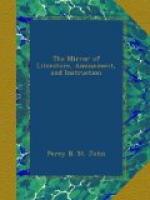“When the body was put into a coffin at Whitehall,” says Rushworth, “there were many sighs and weeping eyes at the scene; and divers strove to dip their handkerchiefs in the King’s blood.” A general gloom and consternation pervaded London on the day of this atrocious perpetration; many of the chief inhabitants either shut themselves up in their houses, or absented themselves from the city. On that day none of the courts of justice sat; and on the next, Whitelocke, one of the commissioners of the Great Seal, says, “The commissioners met, but did not think fit to do any business, or seal any writs, because of the King’s death.” Whitelocke says, “I went not to the House, but stayed all day at home in my study, and at my prayers, that this day’s work might not so displease God as to bring prejudice to this poor afflicted nation."[8] Evelyn, in his Diary, writes, “I kept the day of this martyrdom as a fast, and would not be present at that execrable wickedness, receiving the sad account of it from my brother George and Mr. Owen, who came to visit me this afternoon, and recounted all the circumstances.” Archbishop Usher came out to witness the scene from his house at Whitehall; but he fainted when the King was led out on the scaffold.
[8] There is, I am informed, a tradition in Westminster School, that South, the celebrated divine, was the boy whose turn it was to read prayers on the day of Charles’s death; and that he read the prayer for the king as usual. South at that time must have been about fourteen years of age. Five years afterwards, when the loyal and learned divine was at Christ Church, Oxford, we find his name to a copy of Latin verses, addressed to the Protector on his conclusion of a treaty with the States of Holland. This, no doubt, was a mere college exercise. See Musae Oxoniensies, 1654.
The Journals of the Commons show, either that nothing was done, or that it was thought fit to enter nothing on these eventful days. On the day of the execution there is only the following remarkable entry:—
“Ordered, That the common post be stayed until to-morrow morning 10 o’clock.”
On the 31st, Commissary-general Ireton reports a paper of divers particulars touching the King’s body, his George, his diamond, and two seals. The question being put, that the diamond be sent to Charles Stuart, son of the late King, commonly called Prince of Wales, it passed with the negative. The same question was then put, separately, as to the garter, the George, and the seals: as to each, it passed in the negative.
When the news of the decapitation of the King reached Scotland, that loyal people were moved with horror and indignation.
Most of the gentry put on mourning; the chair of state in the parliament house, the uppermost seats in the kirks, and almost all the pulpits, were clothed in black.




